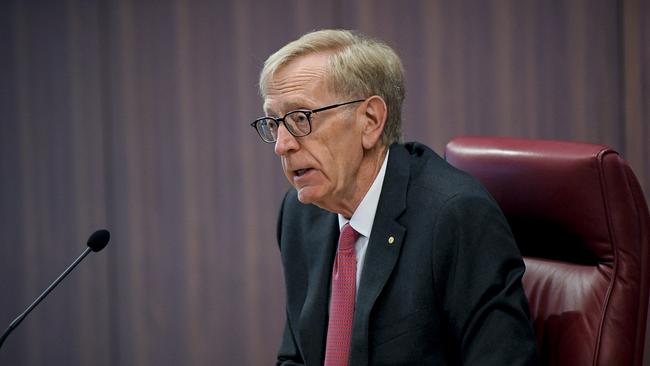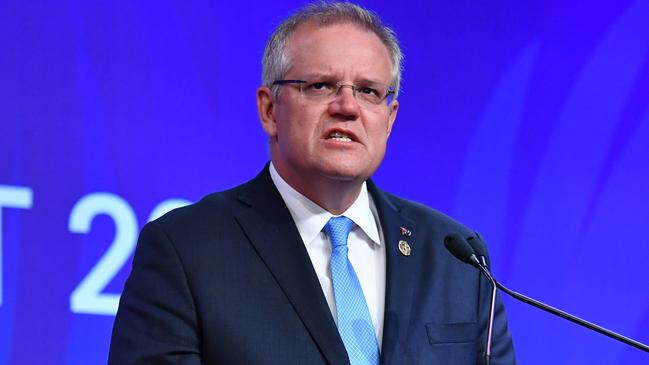Terry McCrann: An interesting year lies ahead in the world of finance
The penultimate session of the banking royal commission takes place over the next two weeks, when various combinations of the two top guys in the big four banks will be called to account for the banks’ sins, writes Terry McCrann.
Business
Don't miss out on the headlines from Business. Followed categories will be added to My News.
The penultimate session of the banking royal commission takes place over the next two weeks, starting in Sydney tomorrow.
Various combinations of the two top guys — the chairman and CEO — in the big four banks will be called to account for the sins that have been detailed over the past few months.
The heads of the two key regulatory agencies — APRA, which is supposed to ensure that banks don’t fail, and ASIC, which is supposed to ensure they do the right thing — will also be grilled for their failings.
BILL TO REPAY RIPPED-OFF BANK CUSTOMERS NEARS $5B
MORE TYPES OF CUSTOMER COMPENSATION ON THE CARDS
WORST ACTS OF GREED FROM ROYAL COMMISSION
Those of ASIC are obvious, although there’s more than a reasonable question of how much was its fault. Those of APRA are not quite so clear: no big bank or indeed any other legitimate financial institution failed; the ones that did were all marginal players that were dodgy from the get-go.
On the evidence of the earlier rounds, we can expect a lot of verbal mauling from the RC’s two main attack dogs, QCs Rowena Orr and Michael Hodge, and in response a lot of grovelling and mea culpas and promises of “never again” and “changed culture”.
Presumably if they could be trusted, we could all but disband ASIC rather than aim at dramatically beefing up both it and the underlying law and regulatory power, and demanding it go really feral.
This might once again be good theatre and give those who feel and those who indeed were mistreated by a financial institution some sense of satisfaction, if little financial return. The financial compensations have now essentially been baked in.
But it’s the final session of the RC that now becomes the “main game”: what commissioner Kenneth Hayne recommends in his final report, which will go to the government at the start of February.

It now looks most likely that will still be the Morrison Coalition Government. But by then it and the rest of us will be well and truly in at least the “phony” election campaign, if not the real one, which has to be held before mid-May.
We will get indirect confirmation of that when the mid-year budget update should surface next month, more in the form of a mini-budget.
There is no way the real Budget could be done at its usual time in early May — it would either have to be brought forward into March or postponed to after the election.
It would make far more sense for the government to effectively launch its campaign off the back of a December document. It will be able to project good numbers for the economy and so also good numbers for the Budget — to hopefully give it both a return to surplus and some money to spend.
Indeed, that could well be its last chance to do that.
Right now, the economic sun is still shining even though clouds have formed over both the broad property market and so the key sector that has been driving the economy — construction, which one way or another employs so many tradies.
All that is a topic for another column; let’s just focus on how this plays into the consequences of the RC, after the election.

One future is the RC report being acted on by a re-elected Morrison government. The (much, to almost certainly) more likely future is that it is not only acted on by a Shorten Labor government, but it merges with the key policy changes a Labor-Green coalition will deliver.
The two key ones in this context are the big increase in capital gains tax and the big cut to negative gearing. The combination will have a huge — negative — effect on property.
Broadly, the two biggest changes that will emerge from the RC will be a tightening of bank lending, mostly, of course, to buy both owner-occupied and investment property; and banks exiting, willingly or unwillingly, the whole superannuation, financial advice and fund management areas.
One thing the RC has unequivocally turned out to be is a huge free kick for the industry super funds — mostly deserved (whether because the banks arrogantly went to sleep or directly and, in some cases, deliberately stuffed up and ripped off).
Now it might seem to many that life will go on pretty much as before, only better and more ethically. That will not be the case.
The banks have never had it so good than as in the past half-dozen or so years — and as a consequence most of their customers benefited. That’s whether as borrowers, as depositors or just as transactors. And, of course, as shareholders — including, through industry super funds.
That world was already ending; it might have been about to end with a brutal thud. The RC adds one further layer that is already cutting bank lending; the economy might accelerate this; and then we get Labor’s investment sledgehammer.
The coming year is going to be “interesting”.



